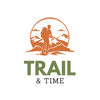A Trail into the Wild
There are few places in the lower 48 states as remote and untamed as The Maze District of Canyonlands National Park. A labyrinth of canyons, towering rock formations, and stark desert solitude, The Maze Overlook Trail is one of the best ways to experience this otherworldly landscape. It’s a trail that demands effort—rugged terrain, technical scrambling, and absolute isolation—but for those willing to take on the challenge, the rewards are unparalleled.
Trail Overview
- Distance: 8 miles out-and-back (optional loops up to 12+ miles)
- Duration: 3-3.5 hours for the standard route
- Difficulty: Moderate to strenuous (Class 4 scrambling required)
- Elevation Change: 500-750 ft descent over 1 mile
- Terrain: Slickrock, sand, steep ledges, and cairn-marked paths
While this isn’t the most technically demanding trail in the national park system, it’s far from a casual day hike. The descent into the canyon features sections of Class 4 scrambling, meaning you’ll need to use both hands and feet to maneuver the terrain. Moki steps—small footholds carved into the rock by Indigenous peoples—are scattered along the way, adding a historical element to the route.
Getting There: A Drive That’s Almost as Challenging as the Hike
Reaching the Maze Overlook Trailhead is a serious endeavor in itself.
- From Hans Flat Ranger Station – The standard route to the trailhead requires a 25-30 mile drive down the Flint Trail, a rough, winding 4WD route with steep switchbacks.
- From UT-24 – Hans Flat is reached via a 46-mile dirt road from the Goblin Valley area.
- Alternative Access – If you don’t have high-clearance 4WD, you can park at North Point Road (2WD accessible) and hike 15 miles to the overlook—a daunting alternative, but an option for dedicated backpackers.
Road conditions vary drastically. When dry, they’re passable with the right vehicle, but after rain, the clay-heavy roads can turn into an impassable mess.
What You’ll See Along the Trail
Expansive Overlooks & Otherworldly Rock Formations
From the moment you reach the overlook, the view is staggering. The Maze District’s canyons twist and contort in every direction, giving the region its name. Chimney Rock stands prominently, and in the distance, the Needles District’s jagged skyline stretches across the horizon.
Cultural History – The Harvest Scene Pictographs
Beyond the geological wonders, The Maze has been home to Indigenous peoples for thousands of years. One of the most fascinating remnants of this history is the Harvest Scene pictographs, located in Pictograph Fork, about 3 miles from the canyon bottom.
- These Barrier Canyon Style pictographs are estimated to be 1,500 to 4,000 years old, though some evidence suggests parts may be older, up to 7,000 years.
- Recent studies using optically stimulated luminescence (OSL) indicate that sections of the Great Gallery, another Barrier Canyon site, were created between 900 and 2,000 years ago.
- The artwork features anthropomorphic figures, animals, and intricate designs, believed to have spiritual or ceremonial significance.
For those willing to extend their adventure, a side trip to Harvest Scene offers one of the most remarkable archaeological experiences in the park—a rare glimpse into the artistic and cultural expressions of the Desert Archaic peoples.
Challenges & Considerations
Water & Supplies
- There are no reliable water sources in The Maze. Even seasonal springs, such as Below Maze Overlook, are often dry.
- Carry at least 4 liters per person per day—more if extending into multi-day exploration.
Navigation & Isolation
- Sparse cairns mark the trail, but navigation skills are essential. Bring a topo map, GPS, and compass—don’t rely on technology alone.
- No cell service. You are truly off the grid here. Leave an itinerary with someone before you go.
Weather Conditions
- Spring (March-May) & Fall (September-November) are ideal, with daytime temperatures between 60-80°F.
- Summers are brutal, with temperatures soaring past 100°F, making it dangerous for hiking.
- Winters can be icy and unpredictable.
Why Take on This Hike?
The Maze Overlook Trail isn’t just a hike—it’s an experience of complete wilderness. It’s not for everyone, and that’s what makes it special.
- A True Backcountry Challenge – Few places in the U.S. offer this level of remoteness.
- Unmatched Scenery – Nowhere else in Canyonlands replicates the twisting labyrinth of The Maze.
- A Rare Historical Encounter – The Harvest Scene pictographs are a profound glimpse into an ancient world.
This is a trail for those who crave solitude, adventure, and the raw beauty of untouched landscapes. If you’re ready to step into one of the most remote corners of the American Southwest, The Maze Overlook Trail delivers.
Download & Print a free fact sheet and map from the National Park Service





